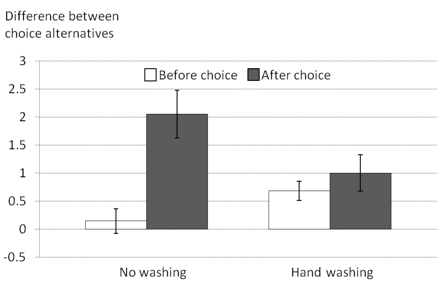Hand-washing
This is hilarious. Hand-washing apparently has profound psychological effects, which are usually purported to be metaphorical (“Out, damn’d spot!”). But this leaves me dying for experimental clarification -what happens to the postdecisional dissonance if the subjects instead:
4) play a video game?
(and for longer and shorter durations, of course)
Science 7 May 2010:
Vol. 328. no. 5979, p. 709
DOI: 10.1126/science.1186799
BREVIA
Washing Away Postdecisional Dissonance
Spike W. S. Lee* and Norbert Schwarz* To whom correspondence should be addressed. E-mail: spikelee@umich.edu
Hand washing removes more than dirt—it also removes the guilt of past misdeeds, weakens the urge to engage in compensatory behavior (1), and attenuates the impact of disgust on moral judgment (2). These findings are usually conceptualized in terms of a purity-morality metaphor that links physical and moral cleanliness (3); however, they may also reflect that washing more generally removes traces of the past by metaphorically wiping the slate clean. If so, washing one’s hands may lessen the influence of past behaviors that have no moral implications at all. We test this possibility in a choice situation. Freely choosing between two similarly attractive options (e.g., Paris or Rome for vacation) arouses cognitive dissonance, an aversive psychological state resulting from conflicting cognitions. Peoplereduce dissonance by perceiving the chosen alternative as more attractive and the rejected alternative as less attractive after choice, thereby justifying their decision (4, 5). We test whether hand washing reduces this classic postdecisional dissonance effect.
In individual sessions as part of an alleged consumer survey, 40 undergraduates browsed 30 CD covers as if they were in a music store. They selected 10 CDs they would like to own and ranked them by preference. Later, the experimenter offered them a choice between their fifth- and sixth-ranked CDs as a token of appreciation from the sponsor. After the choice, participants completed an ostensibly unrelated product survey that asked for evaluations of a liquid soap; half merely examined the bottle before answering, whereas others tested the soap by washing their hands. After a filler task, participants ranked the 10 CDs again, allegedly because the sponsor wanted to know whatpeople think about the CDs after leaving the store (6).
Can washing one’s hands attenuate the need to justify a recent choice? Yes (Fig. 1). For those who merely examined the soap, the preference for the chosen over the rejected alternative increased from before choice [mean (M) = 0.14 and SD = 1.01] to after choice (M = 2.05, SD = 1.96) by an average of 1.9 ranks [F(1, 38) = 20.40, P the standard dissonance effect. In contrast, for those who washed their hands, preferences were unaffected by their decision [before choice, M = 0.68, SD = 0.75; after choice, M = 1.00, SD = 1.41; F reduced the need to justify one’s choice by increasing the perceived difference between alternatives [F(1, 38) = 6.74, P = 0.01, for the interaction of time and hand-washing manipulation].
A study with a different choice task, cleaning manipulation, and measure replicated this finding (7). In individual sessions, 85 students responded to an alleged consumer survey about four fruit jams (shown in pictures). They were subsequently offered a choice between two jars as a sign of the sponsor’s appreciation. After their choice, participants completed an ostensibly unrelated product survey about an antiseptic wipe; half merely examined the wipe, whereas others tested it by cleaning their hands. Next, they rated the expected taste of the four jams (0 = notgood at all; 10 = very good).
Participants who did not clean their hands after making a choice expected the chosen jam to taste much better (M = 8.00, SD = 1.65) than the rejected jam (M = 6.43, SD = 1.81) [F(1, 83) = 27.54, P attenuated this difference to nonsignificance [for chosen jam, M = 7.63 and SD = 1.56; for rejected jam,M = 7.23 and SD = 1.25; F(1, 83) = 1.79, P = 0.19, for the simple effect]. Thus, hand cleaning significantly reduced the classic postdecisional dissonance effect [F(1, 83) = 7.80, P = 0.006, for the interaction of product and hand-cleaning manipulation].
These findings indicate that the psychological impact of physical cleansing extends beyond the moral domain. Much as washing can cleanse us from traces of past immoral behavior, it can also cleanse us from traces of past decisions, reducing the need to justify them. This observation is not captured by the purity-morality metaphor and highlights the need for a better understanding of the processes that mediate the psychological impact of physicalcleansing. To further constrain the range of plausible candidate explanations, future research may test whether the observed “clean slate” effect is limited to past acts that may threaten one’s self-view (e.g., moral transgressions and potentially poor choices) or also extends to past behaviors with positive implications.
www.sciencemag.org/cgi/content/full/328/5979/709/DC1
Materials and Methods
References and Notes
